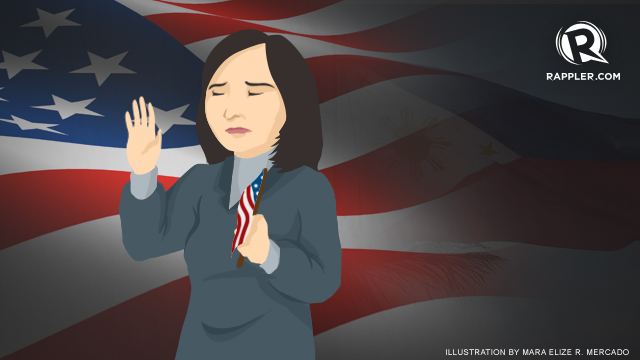SUMMARY
This is AI generated summarization, which may have errors. For context, always refer to the full article.

“Do you renounce your Philippine citizenship?” My answer were two little words, but the hardest words I ever spoke – in fact, I choked on them.
Becoming a US citizen was an important event in my life. After being an illegal alien or TNT for 6 years, the 1986 amnesty afforded my husband and me the chance to finally breathe free.
For 6 years we lived in fear. There were too many sleepless nights wondering when we would get caught and deported. I had recurring nightmares of being on a plane and shot down by immigration police. Stories of my own countrymen turning in illegal aliens for the reward circulated and we didn’t know who to trust.
Three years after our legalization, we applied for citizenship. At the oath-taking ceremony, we were shown videos of America’s might and power. Later, I raised my right hand, pledged allegiance to the flag, vowed to protect the land of the free and home of the brave.
Fragility in a new country
I don’t remember if it was the effect of the videos I watched, but somehow, I felt patriotism towards my new country almost immediately. As an illegal alien, I didn’t feel I belonged – everything seemed temporary and fragile.
On the way home from the ceremony, I was introspective. Have I changed? Should I change? Did I become an American citizen for expediency or was I ready to embrace the American way of life? Was I willing and able to forget the culture into which I was born and raised?
I knew for certain that there were habits that I grew up with that I had to discard to fit into the society I chose to belong – Filipino time or being late for appointments, being unmindful of the environment, not following traffic rules and regulations, the “ningas kugon” (not following through) attitude.
Even as I contemplated these changes that I had to make, I vowed to become the best citizen I could be for my new country and that meant fulfilling my civic duties. I never excused myself from jury duty and I voted in all elections.
Legalization made us official; citizenship gave us ownership. My American dream came true.

From angst to adventure
That did not prevent me from feeling guilty that I had renounced my Philippine citizenship. I lived with this angst for a long time until I realized tht I didn’t have to forget my past to ensure a better future. I could take what was good of both countries and be better for it.
With this in mind, our household became a mixture of American and Filipino traits. My son and my grandchildren were brought up to say “po,” a sign of respect when addressing someone older. If there was disagreement, they could state their case but in a respectful way. There was no swearing in our presence, a lesson my son learned the hard way after I washed his mouth with soap.
Even the manner that we raised our son, who was born in America, was different from the way our daughters, who were all born in the Philippines, were brought up. As parents in the Philippines we were remiss in a lot of ways – we did not attend PTA meetings, my mother-in-law did.
We were not hands-on parents, my mother-in-law and the yayas (nurse maids) attended to the children. When our girls were growing up and in their teens, we were not there for them. In spite of us – and I credit my mother-in-law for this – all 3 girls grew up to be responsible women.
Still Filipino at heart
Maybe because in the US, my husband and I only had each other for support, our son grew up being cared for by both us. We read to him when he was little, tucked him in bed at night, had him stand in the corner countless times, took him to several emergency room trips – he was one hyper kid who ran into things consistently.
My husband and I went to school open houses, parent-teacher conferences, sports. We were co-participants in his activities. We tried – and I think succeeded – to steer him away from drugs, not an easy feat for a teenager in the 90s in America.
If there was an area where being both American and Filipino merged flawlessly, it was in food. We didn’t see any problem in having steak and pinakbet (a dish made of a mixture of native vegetables seasoned with fish sauce) together in a meal. Eating hot dog with rice wasn’t weird. Potato leek soup was consumed with fried fish.
Life in the United States has been and still is an adventure for me. I will never cease to wonder and be awed by its history, its vastness, the sheer beauty of the land and the warmth of its people. I am both proud and humbled to be part of its citizenry but I am not forgetting that who I am today is a product of two countries – the one I was born into and the one that adopted me.
“Americanism is a question of principles, of idealism, of character: it is not a matter of birthplace or creed or line of descent.”
— Theodore Roosevelt, adventurer, politician and Nobel Prize-winning 26th U.S. president (1858-1919)
Monin Muriera-Navarro lived and worked in the US for more than 30 years. She held the position of administrative manager for an engineering and environmental consulting corporation. She retired in 2010 and lives in Baguio City.
Add a comment
How does this make you feel?
There are no comments yet. Add your comment to start the conversation.